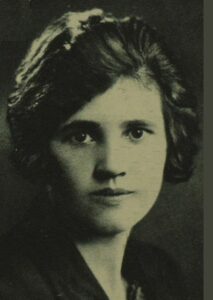Jennie Lee (3 November 1904 – 16 November 1988) was a Scottish politician and a prominent figure in the Labour Party. She served as a Member of Parliament from 1929 to 1931 and again from 1945 to 1970. Lee played a crucial role in the establishment of the Open University during her tenure as Minister for the Arts in Harold Wilson’s government (1964-1970). She worked closely with Wilson to ensure that enrollment in the university would be open to all, regardless of educational qualifications.
Born in Lochgelly, Fife, Lee inherited her father’s socialist beliefs and joined the Scottish Independent Labour Party before eventually joining the Labour Party. She received her education at Beath High School and the University of Edinburgh, where she actively participated in various student organizations and campaigns, including advocating for Bertrand Russell as Rector of the University. After graduating with an MA, LLB, and teaching certificate, she worked as a teacher in Cowdenbeath.
Lee’s political career began when she won a by-election in 1929, becoming the youngest woman in the House of Commons. Known for her left-wing views, she was a staunch supporter of the Independent Labour Party (ILP) and frequently opposed the Labour Party’s leadership. Lee lost her seat in the 1931 general election but remained politically active, advocating for British support to the Spanish Popular Front during the Spanish Civil War.
After rejoining the Labour Party, Lee was re-elected to the Commons in 1945, representing the Cannock constituency. She continued to champion progressive causes and was appointed as the first Minister for the Arts in Wilson’s government. Lee’s most significant contribution was her instrumental role in the establishment of the Open University. Despite facing opposition, she persevered and ensured that the university, offering courses through correspondence and broadcasting, became a reality. The Open University was granted its Royal Charter in 1969, and the first students began their studies in 1971.
Lee’s dedication to the arts extended beyond education. She renewed the charter of the Arts Council of Great Britain, oversaw the expansion of its work in the regions, and played a key role in creating new arts institutions, such as London’s South Bank Centre. Lee retired from front-line politics in 1970 and was made Baroness Lee of Asheridge. She continued writing and received honorary degrees and fellowships for her contributions.
Jennie Lee passed away in 1988 at the age of 84. Her commitment to education and the arts left a lasting impact, and her personal papers are preserved in the Jennie Lee Collection at the Open University. Numerous memorials, including buildings, streets, and plaques, commemorate her legacy throughout the United Kingdom.
More information:
Wiki
University site



Leave a Reply